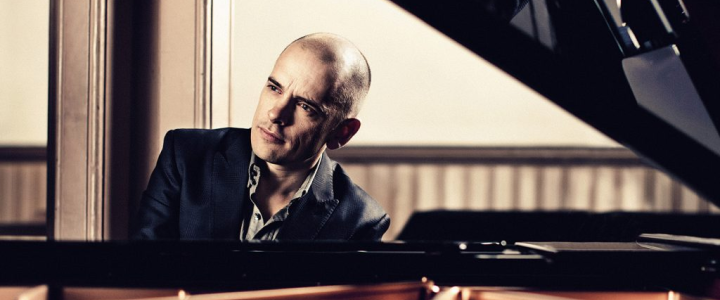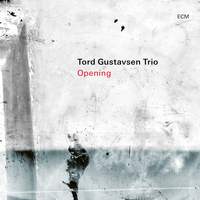Interview,
Tord Gustavsen on piano trios and Scandinavian folk tunes

Though his recordings can take many different forms, the music of Norway’s Tord Gustavsen consistently captures an understated, minimalistic approach to sound that puts him squarely at the centre of the modern Nordic jazz tone. Even so, you’d be remiss not to catch the very lyrical approach Tord takes to crafting his original tunes and his re-interpretations of folk songs from his native country. Currently in the midst of a worldwide tour, Tord kindly joined us from his hotel room to discuss his recent trio album Opening (one of our Recordings of the Week last month), his love of the piano trio, and the importance of improvisation.
What were some of your first experiences with playing music, and when did you start taking it more seriously?
I was immersed in music from a very young age; my father wasn’t a professional pianist but often played at home, so I'd sit on his knee and play four-hand pieces with him when I was about 4 years old or so, and I’ve been playing ever since. It was nice that I got into music firstly as a way of expressing myself and improvising; it wasn’t until a few years later that my father taught me how to read music. I think I had quite a healthy and stimulating start to music – I didn’t start out by learning ‘how to not play the wrong notes’, so to speak, but I’m also hugely grateful that I had the chance to learn a lot of classical music in my youth, though that came a little later.
So you had a combination of the more studious approach via classical music, as well as freely exploring the instrument?
Yes, and I also had many chances to play in church and with choirs, which my family actively took part in. There were always places for us to play, and places where my playing was appreciated without it necessarily being a concert; I think that helped a lot with avoiding performance anxiety, not having the focus be on my playing as such. That was a big part of my youth.
And then at some point, you went on to study a Bachelor’s degree in Psychology…
Yes, I always wanted to continue playing music but didn’t think of it as a profession, and I didn’t know anyone who was doing it professionally – I just knew I’d always be playing the piano no matter what I was doing. I became very interested in social studies and psychology, studying those at university in Oslo, but it was during those few years that music also became more central to my daytime life; I started forming bands and getting more involved in the city’s jazz scene. It was at that point that I realised I probably had to try to do music also full-time, to see what could happen from that.
It was when I was accepted to the music conservatory in Trondheim that I started to think ‘maybe this is also my path professionally’, although I did keep my nerdy theoretical passions; I even wrote a Master’s thesis on the psychology of improvisation, which ended up being a really beautiful way of tying it together with my actual experiences as a performer, shedding light on the paradoxes and challenges of improvising.

Over the course of your recording career you’ve made records with various different ensembles, but you often go back to the piano trio – is there something about that format that keeps inspiring new work?
I would say that the piano trio has the perfect balance of being small enough for the chamber music-like interplay, but also large enough that you have a huge palette of textures available. Some say that the piano trio is what one should always focus on as a jazz piano player, but for me I value both the interplay and accompaniment of duos and larger groups just as much as soloing, and do many side-projects with choirs, vocalists, cello players and what have you – they’re all equally important to me.
I started recording under my own name with the classic piano-bass-drums formation, but when the bass player for our first trio sadly passed away it didn’t feel quite right to just do another trio lineup, which is what sparked my interest in exploring quartet and quintet formations, as well as an alternative trio with synth bass and vocals. It wasn’t until 2018 that it felt time again to return to the acoustic trio with double bass and drums.
And in all those ensembles, you have a long-standing relationship with your drummer Jarle Vespestad – how did you two meet and start working together?
I was a huge fan of Jarle before starting at the conservatory, he was among the best drummers I knew. When I moved back to Oslo following my studies I was putting together a band to accompany a pop-jazz singer and asked him to be part of it… I was a bit intimidated at first but I really wanted to have him involved! Quite early on it seemed like we had a great musical chemistry, and the trio grew from that. We wanted to explore this more radical minimalistic style, thinking about music in a more stripped-down way where every single note counts, building complexity and multi-layered music from a simple beginning.
Jarle and I have played hundreds of concerts together over the years and I feel very blessed to have worked with him for so long. He’s a very melodically-inclined drummer, he has all the technical ability in the world to do what he wants on the drumkit, but the way he sets aside his ego to aid the music is really beautiful.
When did you start working with Steinar Raknes, the bass player on Opening? What do you like about what he brings to the trio?
He joined the trio during the pandemic when we were doing concerts with very restricted crowd numbers. Our previous bass player had to leave the band for personal reasons, and for a little while we actually had three different bass players we were exploring material with, which was a great arrangement but a little complicated; they all brought different kinds of beauty and textures to the music, but when it came time to recording it gradually became clear that Steinar was the one who was the most different from our previous bass player, he was the one challenging me in a more radical way that I felt would be good for the music. He’s a strong soloist, a bit more bold in his expression, but has a very warm sound to his instrument too.

What is the significance of the title of your new album, Opening?
The most obvious meaning is that it was made during lockdowns, during that time where we all realised how much open our society is, and how much we long for open spaces where we can be around real people – and how strange it is to not be allowed to go where we want and meet who we want. Besides that more surface-level meaning, to me it’s about the challenges and blessings of opening oneself to whatever is here and now, to being played by inspiration rather than forcing things into existence. It’s good to have plans and visions, but it’s equally important to allow yourself to be an instrument for the forces of inspiration. One of the tunes on the album, ‘Fløytelåt’ (’The Flute’), is based on a piece by the Norwegian composer Geirr Tveitt – it’s quite a significant piece of music for most Norwegians of my generation or older. The lyrics describe the process of going into the woods and cutting a piece of birch to make a flute; the more metaphoric concept of the words is about tuning yourself to be open enough to be made a flute yourself.
There is some other Scandinavian repertoire on the record, how did you go about choosing those pieces?
Firstly, we also included a Norwegian hymn on the album, which is a reflection on the previous trio where we played quite bold rearrangements of chorales by J.S. Bach, and during my own concerts there’s often this dialogue between my original pieces and very free versions of different kinds of hymns, those are the ‘jazz standards’ I grew up with so to speak.
As well as that there’s also this Swedish work that we quote on the album, Jazz på svenska (‘Jazz In Swedish’) written by the late Jan Johansson who was a groundbreaking, fantastic piano player from Sweden who used folk tune material in a very special way. During the pandemic I sat down and taught myself all the pieces off that record, after which that Swedish folk tune kept coming out in improvisations with the trio – even during concerts various folk tunes appear as interludes spontaneously, and in the studio this one ‘Visa från Rättvik’ (‘View From Rättvik’) was played as an outro after a free improvisation.
You’re in the middle of a tour at the moment, but is there anything else you’ve got on the horizon for the rest of 2022?
I have a few things coming later in the year, but my main focus at the moment is being present for this tour. What normally happens when we tour is that new material starts to emerge during soundchecks without us having to force anything out, and a new set of tunes gradually materialises out of that. That might happen this time, and we might record something next year, but we’ll see! Right now it’s just about being in the moment with these two fantastic musicians, playing the material over and over – we’ve got between 40 to 50 concerts from now until November, but going home in between that. In June I’ve got a festival I’m curating for meditational music across various genres and spiritual traditions; everything from mediaeval chants to interesting contemporary music, to traditional music from Iran and India for four days, and I’ve also been bold enough to say I’ll play myself alongside some of these people! It’s really a dream festival for me, and the name plays on the Norwegian word ‘Ånd’ which means both ‘to breathe’ and is the term used in the Bible for the Holy Spirit… ‘Deep Breaths’ would be a good name for it, but it’s a little hard to translate into English!
Browse all Tord Gustavsen releases here...
Opening is out now on ECM Records...
Available Formats: CD, MP3, FLAC, Hi-Res FLAC



